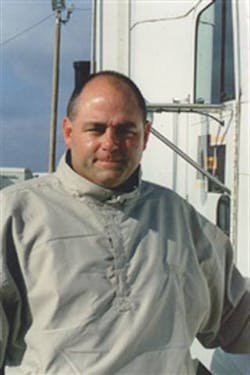Continental targets flag brand market share growth: New truck tires are just the start, says Armstrong
Continental Tire North America Inc. (CTNA) has aggressive plans for its Continental brand in the domestic medium truck tire market. "We're going to move it as far ahead as we can," says Clif Armstrong, director of OE and brand management for CTNA's Commercial Division.
The company recently introduced seven new products that complete its Continental brand truck tire lineup (see sidebar). "Up until now, we did not have a Continental-branded product for every application," says Armstrong. CTNA is positioning the tires as premium-level items to compete directly with top-tier truck tires made by Bridgestone Americas Holding Co., Goodyear Tire & Rubber Co. and Michelin North America Inc.
Commercial Tire Dealer recently sat down with Armstrong to discuss CTNA's goals for the Continental label commercially, the Commercial Division's performance last year and other topics.
CTD: According to our research, the General brand enjoys a larger share of the domestic replacement truck tire market (5.5%) than the Continental brand (2.5%). Why are you pushing the Continental label?
Armstrong: If you look at the market from a global standpoint, Michelin is a global brand, Bridgestone is a global brand, and Goodyear is a global brand. Continental is much more widely known in Europe than it is here. In the U.S. and Canada, the Continental brand is still growing.
We're saying, "Let's maintain General and build Continental." Short-term, we're looking for a combined market share of 10%, growing Continental 4% to 4.5% over the next three to four years.
But we're not just investing in Continental. We have three new General truck products that we'll see in late 2003, early 2004. And we'll have a major announcement in OE later this year.
CTD: Describe the performance of CTNA's Commercial Division last year. How was 2002?
Armstrong: It was a very good year. We had a modest increase in sales -- about 3%. We had a very healthy gain in profitability. We paid a dividend to our parent company, which was very important.
CTD: In what areas did the Commercial Division make progress?
Armstrong: In 1992, when commercial was split from PLT, (then-CTNA Commercial Division Executive Vice President) Tom Reese put together three long-term objectives: investment in the quality of the product; investment in our production facilities; and getting closer to our dealer base, which is one of our biggest strengths. We haven't changed our strategy since 1992.
CTD: In what areas does the Commercial Division need to improve?
Armstrong: Our strategy is well set, but we need flawless execution. We have to be proactive with our customer base.
CTD: How important are original equipment fitments to your success?
Armstrong: OE is very important. Qualifying for OE today is quite rigorous and gives you one more value add-on for your customers and end users.
Our (OE) focus for medium truck tires is the trailer market. We've carved out a niche and are successful in that market. We do not sell to any tractor manufacturers in the United States. At least for the short term, we will be a niche (OE) player.
CTD: Two-and-a-half years ago, Tom Reese told CTD that the Commercial Division' success may demand the construction of a new truck tire manufacturing plant. Is that still on the agenda?
Armstrong: That discussion is ongoing. We need to have additional capacity. We'd like (a new plant) to be in North America; we think that makes sense. But with the current financials of our industry, it's tough to secure that money.
Our Mt. Vernon, Ohio, truck tire plant is running at capacity; we try to keep it full. Supply is excellent.
CTD: What will CTNA's Commercial Division business be like in 2003?
Armstrong: It's going to be a tough year, especially with the economy being what it is. But at the end of the day, if we run our business the right way, we'll do (what it takes) to be successful.
CTNA is not pursuing new commercial tire dealers at the moment in favor of strengthening its current dealer network, according to Armstrong. "The easiest way to erode profitability is to sell Continental tires on every corner."
